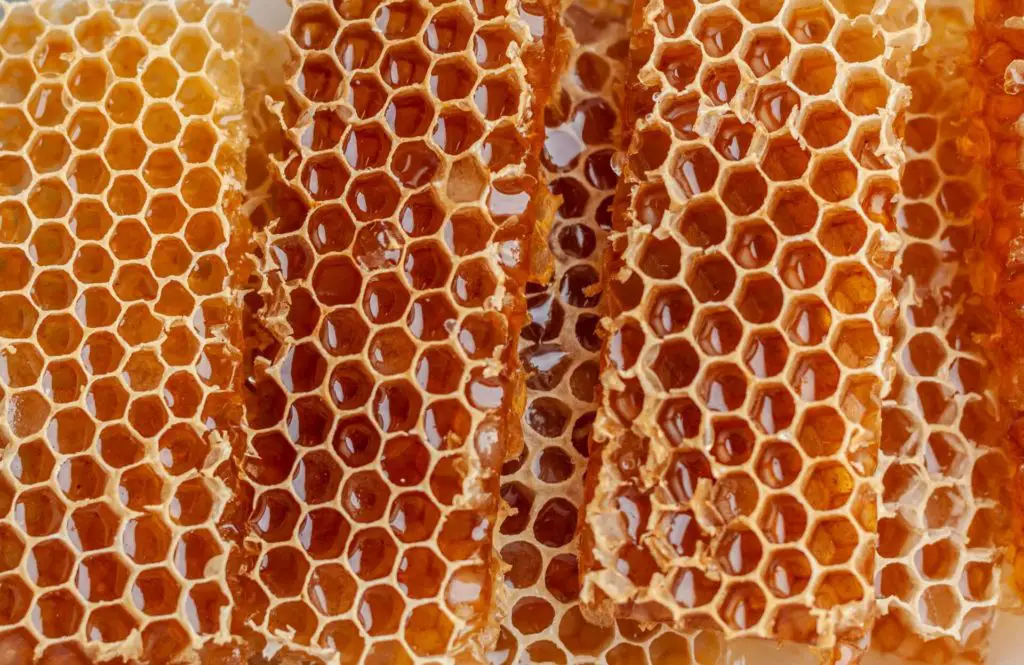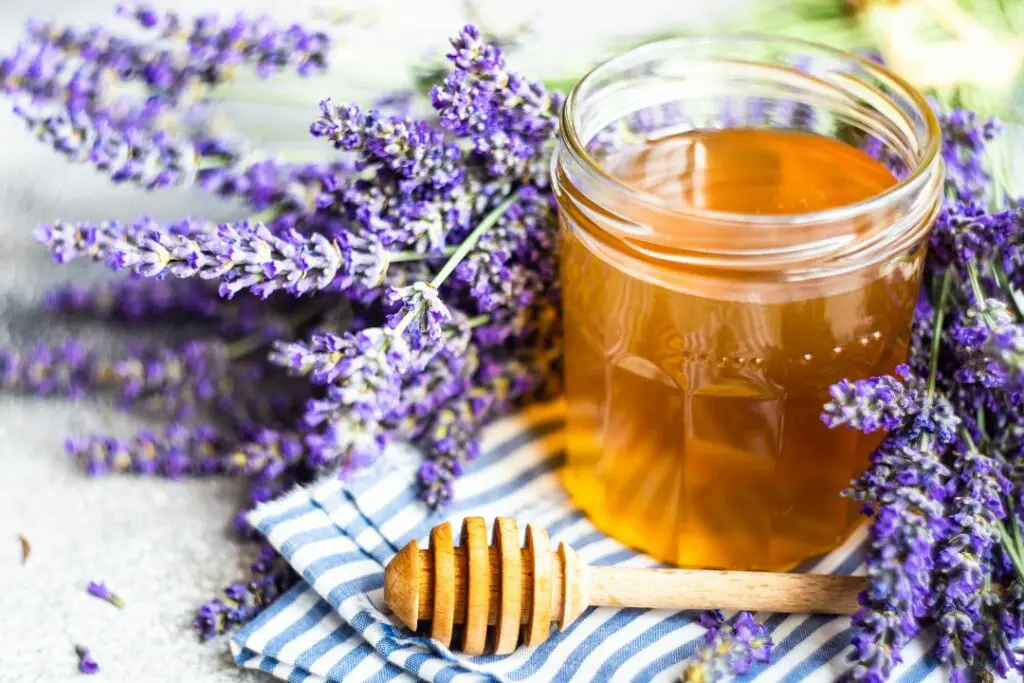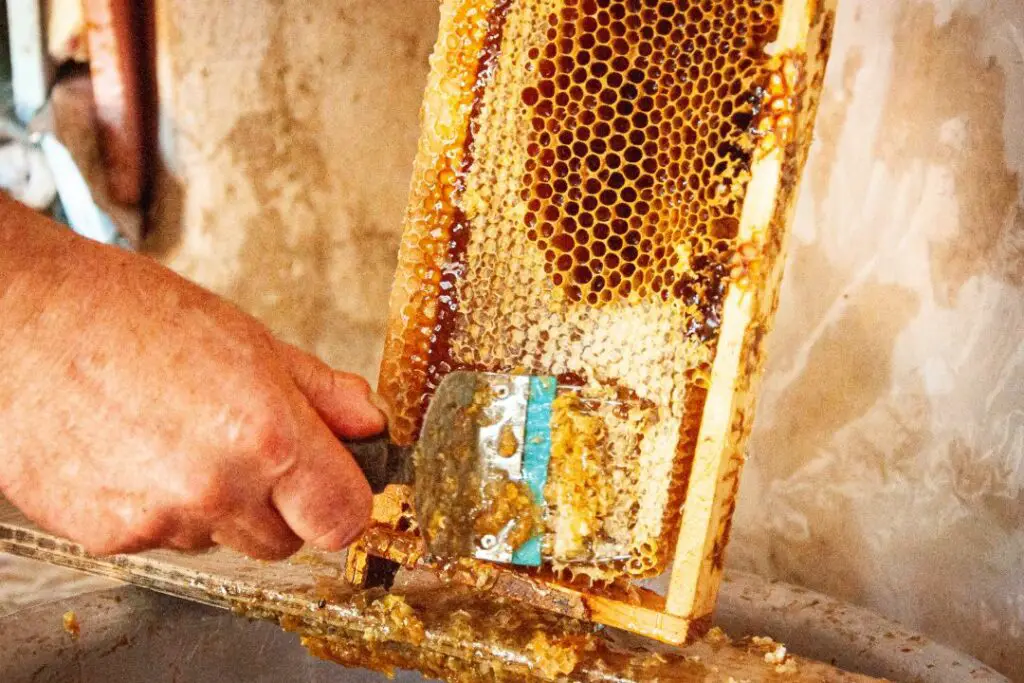Last updated on January 17th, 2024 at 02:05 pm
If you’ve ever found yourself in a situation where you’re eating honeycomb and wondering, is this doing me any good?
I’m here to tell you that it’s delicious and good for you. Not only are the tiny hexagonal cells full of delicious golden goodness, but they also have profound health benefits.
Due to its raw, untreated nature, honeycomb is always a winner with us here at Revive a Bee.
*Additional honey reading – Find out more about how some honey may not be as great as you think in our expose, real honey vs fake honey.
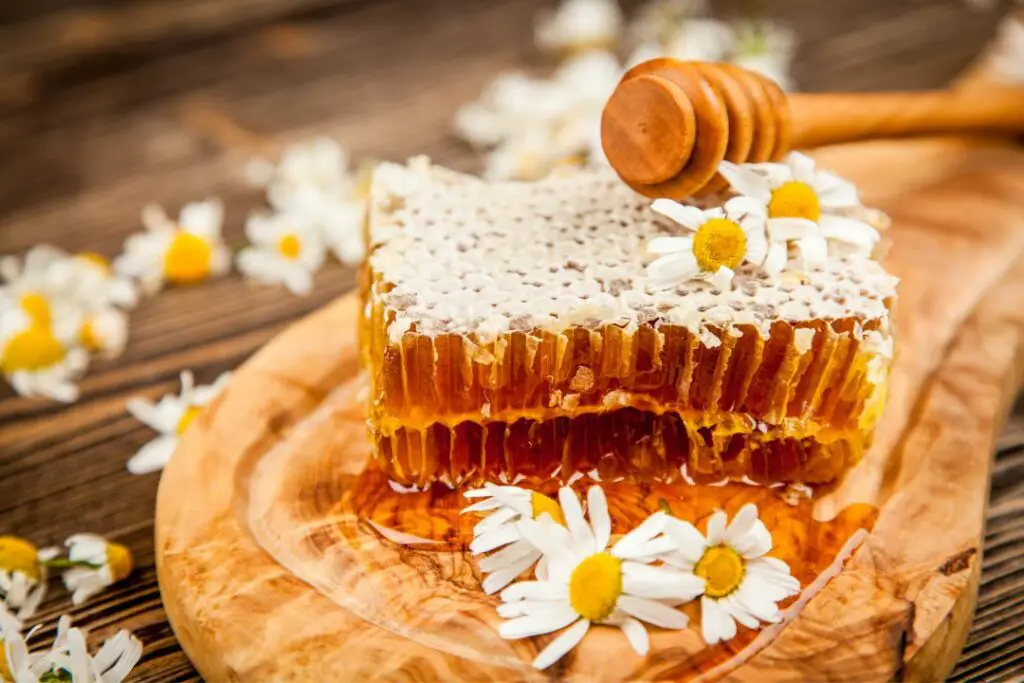
Is Honeycomb Good For You?
Yes, in moderation, honeycomb is good for you. It’s rich in antioxidants and can offer anti-inflammatory benefits that help with day-to-day aches and pains alongside many other conditions.
Honey, and by extension honeycomb, has been used for centuries in traditional medicine.
Going back to hunter-gatherer times, bee hives and the honeycomb within were a rare calorie-dense delicacy prized amongst many hunters.
Let’s look at what that means for us in the modern world.
Honeycomb Is Packed With Texture, Flavour & Protein
If you’re a fan of crunchy snacks, honeycomb is one to look out for. It’s got a great texture and flavour.
The honeycomb has a satisfying crunch, while the golden syrup is sweet and rich.
If that wasn’t reason enough to try it out, it’s also a small source of protein (about 1g per serving) and fibre (0.1g).
Plus, unlike other sugary snacks that can cause tooth decay or weight gain over time, honeycomb contains natural sugars that are much healthier (even though you still shouldn’t consume them in vast amounts).
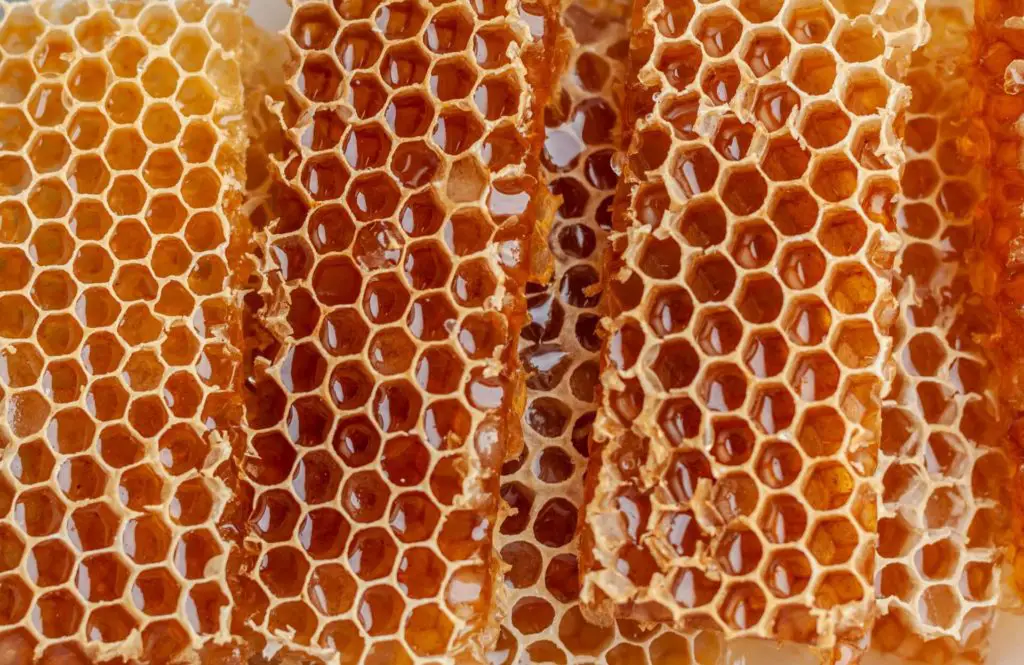
Eat It On Its Own Or As An Ingredient In Recipes
Honeycomb is a fantastic addition to your culinary masterpieces and is a perfect alternative to artificial sweeteners.
If you want to add honeycomb to your salad or other dishes, try these ideas:
- Add a few pieces of honeycomb and sliced strawberries to a spinach salad.
- Toss cubed mango and pineapple with chopped pecans and drizzle with honey before topping with crushed ice. Top with some pieces of honeycomb for crunch.
- Chop up a banana into small chunks and place it in the bottom of the blender with a small chunk of honeycomb. Add coconut milk and frozen fruit like blueberries, raspberries, strawberries, cherries…whatever’s good! Give it a good old whizz, and top off with some whipped cream if desired. Heaven!
If you like smoothies or milkshakes as much as I do (and who doesn’t?), try adding some fresh organic raw local honeycomb from your local store into your creations for a lovely, sweet touch.
*Extra reading – Not sure if your honeycomb smells off? Check out our guide on why honey smells bad (surprise, it’s not always bad).
It Can Help Settle Your Stomach
Honeycomb can also help you settle your stomach. It’s a good fibre source, which helps slow down digestion and keep your blood sugar levels stable.
The antioxidants in honeycomb help reduce inflammation and protect cells from damage, which may reduce the risk of chronic diseases like cancer or heart disease.
Honeycomb is also a good source of calcium, making it an ideal snack for people who don’t get enough calcium through their diet or other sources (e.g., drinking milk).
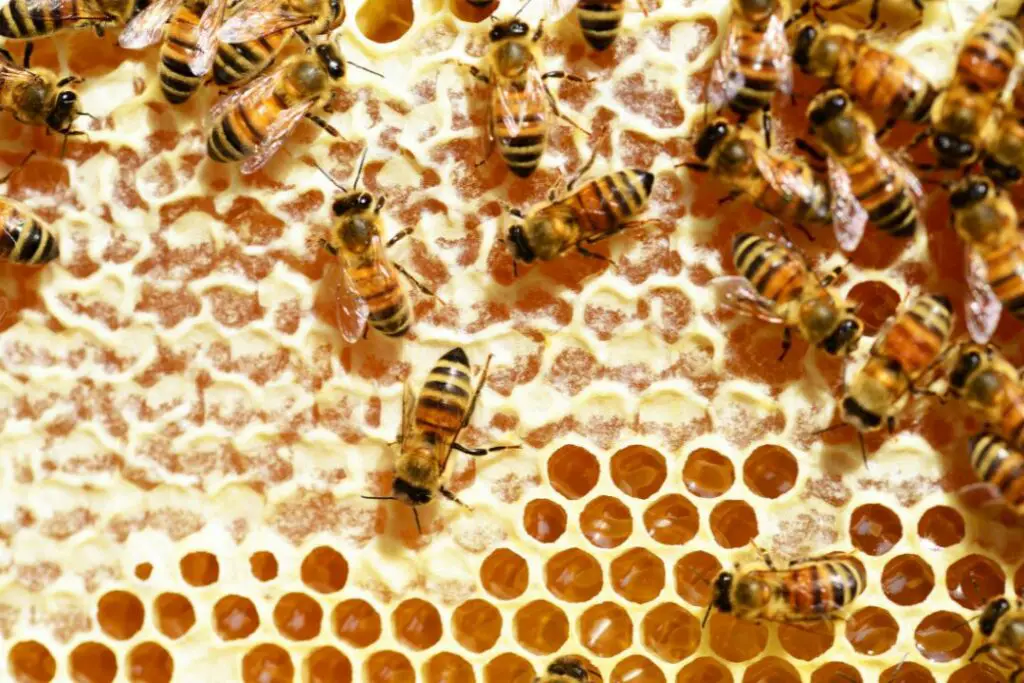
What Other Health Benefits Does Honeycomb Provide?
It’s high in antioxidants. Antioxidants may help protect cells from damage by neutralizing free radicals, which can lead to heart disease, cancer and other conditions.
The antioxidants in honeycomb include phenolic acids and flavonoids, which have been associated with lowering the risk of cardiovascular disease and helping prevent age-related memory loss.
It contains vitamins A & C, plus minerals such as selenium & zinc. These nutrients help boost immunity while helping prevent cancer growth cells by damaging their DNA or stopping them from dividing correctly.
They’ve also been shown effective against Alzheimer’s disease when taken with antiviral medications like Zovirax (acyclovir) so that viruses cannot replicate inside infected cells.
Its Probiotic Properties Help With Your Digestion
Honeycomb is a probiotic food containing beneficial bacteria that can help with digestion and immunity. Honeycomb probiotic benefits can include:
-Helping to fight candida and other harmful bacteria in the digestive tract.
-Strengthening your immune system by encouraging healthy gut flora.
-Boosting your energy levels, as well as your overall mood.
Honeycomb probiotics have also been shown to help support weight loss by reducing appetite and improving nutrient absorption.
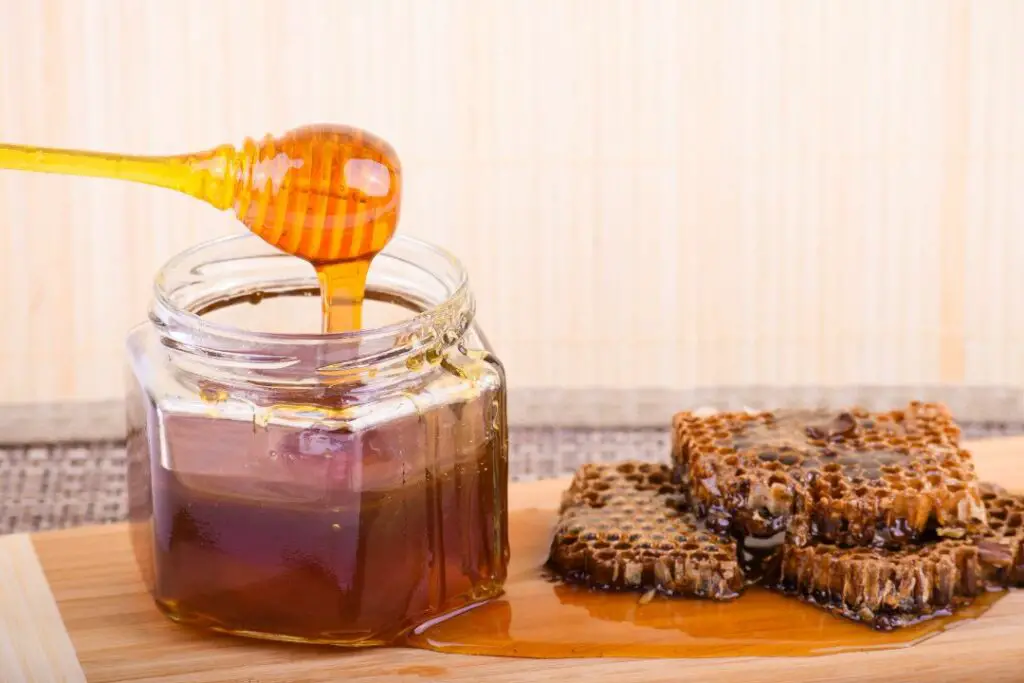
Is Honeycomb Good For Your Immune System?
Honey is well-known for its anti-bacterial properties, but did you know that honeycomb contains an even higher concentration of these antibacterial compounds?
This means that the consumption of honeycomb can help boost your immune system.
In addition to boosting immunity, honeycomb helps with digestion by breaking down food in the stomach and stimulating peristalsis, which moves food through the intestinal tract.
This can lead to better nutrient absorption and faster elimination of waste materials from your body.
Can Honeycomb Help You Lose Weight?
Many people find that eating honeycomb helps them feel fuller for more extended periods, so it can be beneficial if you’re trying to lose weight.
It can also be a healthier alternative to other sweeteners and sugar-laden foods, giving you that sweet tooth hit without as many calories.
But honeycomb is still rich in sugar and should be consumed in moderation as part of a healthy, balanced diet.
*Important tip – Anyone suffering from diabetes must carefully moderate their honeycomb intake as it could lead to spikes in their insulin levels.
Treating Burns With Honeycomb
Yes, that’s right, the benefits of honeycomb extend to treating minor burns by placing honeycomb on the burn and wrapping lightly in a bandage or dressing.
Let’s look at how honeycomb helps heal and prevents pain.
- Honeycomb is a natural antiseptic.
- It’s also an analgesic, meaning it reduces pain and swelling.
- When applied topically to wounds, honeycomb can help prevent infection and speed healing by keeping bacteria from entering the wound via the air or other outside sources.
- Its anti-inflammatory properties reduce swelling in tissues and joints, making it an excellent choice for those suffering from inflammation around the burn.
This can alleviate discomfort while limiting the damage caused by burns, resulting in less pain overall!
Conclusion
Honeycomb is without doubt one of nature’s wonder foods.
The benefits of honeycombs range from cooking to health. Just remember that moderation is the name of the game!
As scientists advance medical research, we have no doubt honeycombs will be incorporated into more and more treatments.
Don’t miss our other great reads below, packed with fascinating facts about bees, honey and all sorts of other pollinators.

